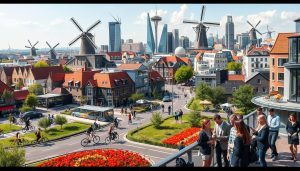Expanding a business to the Netherlands comes with both benefits and hurdles. The country’s location in Europe, low taxes, and friendly business laws are big pluses. These can help your business grow.
Advantages of expanding your business in the Netherlands
The Netherlands offers a prime location for businesses looking to grow in Europe. With easy access to major markets like Germany, France, and the UK, it serves as a strategic gateway for international trade. A well-developed logistics network, including the Port of Rotterdam and Schiphol Airport, ensures smooth distribution and efficient operations. Coupled with a state-of-the-art digital infrastructure, the Netherlands provides everything a business needs to scale and thrive.
A business-friendly tax system makes the country even more attractive. Competitive corporate tax rates, an extensive network of double taxation treaties, and policies like the participation exemption regime help companies minimize tax burdens and maximize profits. The stable regulatory framework, transparent legal system, and straightforward company formation process create an environment where businesses can confidently operate.
Beyond financial benefits, the Netherlands offers a skilled, multilingual workforce and a strong focus on sustainability. The government actively supports green initiatives, incentivising businesses to invest in renewable energy.
Strategic Location & Market Access
The Netherlands provides seamless access to major markets, including Germany, France, and the UK. Its well-developed logistics network ensures cost-efficient distribution, helping businesses reach millions of consumers quickly and effectively.
Companies in the Netherlands can quickly reach 80% of Europe’s main markets by truck in just 24 hours. This fast connectivity, along with the advanced logistics network, helps streamline supply chains and improve operations.
The Port of Rotterdam is a key player in the Netherlands’ success. It handles over 469 million tonnes of cargo each year. This connects businesses to global markets, making import and export processes efficient. With its modern facilities and extensive transport links, Rotterdam port drives growth and success.
Expanding to the Netherlands means access to a thriving domestic market and the entire European Union. The EU has over 500 million consumers and a GDP of €15.3 trillion. This offers endless opportunities for businesses looking to grow and enter new markets.
By using the Netherlands’ strategic location and strong logistics, companies can cut down on transport costs and speed up deliveries. The country’s business-friendly environment and unmatched access to European markets make it perfect for businesses aiming to grow and succeed.
The Dutch Highly Skilled Workforce
The Netherlands is home to a highly educated, English-speaking workforce with expertise in finance, technology, and logistics. With a talent pool that’s both diverse and innovation-driven, businesses can build strong teams and drive success.
The Dutch education system is top-notch, ranking among the best globally. This focus on education means the Dutch workforce is skilled in many areas. From tech and finance to creative fields, the Dutch are well-prepared. They also keep learning and growing in their careers.
Access to a Multilingual Labour Pool
The Dutch workforce is known for speaking many languages. Besides English, many Dutch people also speak German, French, and Spanish. This helps businesses talk to clients and partners all over Europe and beyond. It opens up new markets and supports international work.
High-Level Education System
The Netherlands has a world-class education system. It starts early and focuses on critical thinking and problem-solving. Dutch schools and universities prepare students well for their careers.
This means there’s always a flow of skilled workers. Businesses get to choose from a pool of highly qualified candidates. This is a big advantage for them.
Entrepreneurial Culture and Innovation
The Netherlands is known for its strong entrepreneurial spirit and innovative environment. It’s a great place for businesses looking to grow. It scores high in ICT infrastructure and knowledge absorption. This makes it a top choice for innovation.
Support for Start-Ups and Tech Companies
Entrepreneurs in the Netherlands get lots of help. There are incubators, accelerators, and funding options available. These help new companies grow and thrive.
Public-Private Partnerships in R&D
Collaboration between the public and private sectors drives innovation in the Netherlands. These partnerships involve academia, government, and businesses. They work together to create new solutions and technologies.
Companies investing in energy-efficient assets can get an extra 45.5% investment allowance. This encourages sustainable innovation.
The Netherlands has a highly educated workforce. It has one of the top 10 higher education systems and the highest English proficiency in non-native speaking countries. This talented pool supports the country’s innovation ecosystem.
By using these advantages, businesses expanding to the Netherlands can find a dynamic and supportive environment. This environment fosters growth and innovation.
Favorable Tax & Business Climate
With competitive corporate tax rates, an extensive network of double taxation treaties, and tax-efficient policies such as the participation exemption regime, the Netherlands creates an optimal environment for international businesses. These advantages help companies reduce tax burdens and maximize profits.
The country also offers tax breaks for innovation, sustainability, and creating jobs. This helps businesses grow and succeed.
The Netherlands is known for being business-friendly. It makes it easy to start a business and follow rules. This makes it simple for companies to enter the Dutch market.
The government is also working to reduce rules and make business easier. This helps companies run smoothly.
The Netherlands is a top choice for foreign investment in Europe. It’s expected to grow a lot by 2025. Industries like agriculture, logistics, and green energy will help the economy grow.
The tech sector is also booming. Innovations in AI and blockchain will make businesses more efficient. This will help many industries grow.
Companies can also benefit from the Netherlands’ strong innovation scene. Cities like Amsterdam and Eindhoven have a lively startup culture. This helps businesses grow and work together.
The country has a bilingual workforce. People are skilled in both Dutch and English. This makes it easy for international businesses to set up shop.
World-Class Infrastructure & Connectivity
Rotterdam’s port and Schiphol Airport’s global reach offers unparalleled logistics and connectivity. A cutting-edge digital infrastructureThe Netherlands consistently ranks among the world’s top countries for ease of doing business. A straightforward company formation process, strong legal protections, and a pro-business regulatory framework provide stability and predictability—key factors for long-term success. with high-speed internet ensures seamless operations for modern businesses.
The digital connectivity in the Netherlands is also outstanding. It has fast broadband and 4G for internet everywhere.
The Netherlands’ transport networks are also excellent. It has fast trains, good roads, and waterways for easy travel. This makes it easy to reach 170 million people within 500km and 244 million within 1,000km.
More than 1,000 American and Asian companies have chosen the Netherlands for their European base. It’s a big player in Europe’s trade, being the second largest for imports and exports.
Stable & Transparent Regulatory System
The Netherlands consistently ranks among the world’s top countries for ease of doing business. A straightforward company formation process, strong legal protections, and a pro-business regulatory framework provide stability and predictability—key factors for long-term success.
The Netherlands has a clear and fair regulatory system. It scores 8.5 out of 10 for being open and fighting corruption, says Transparency International. About 80% of Dutch businesses are happy with the rules.
Starting a business in the Netherlands is easy, ranking 4th in the World Bank’s Ease of Doing Business Index. The system is efficient, with clear rules for setting up and running a business. Dutch companies face fewer delays than the European average.
Business Registration and Compliance
Starting a business in the Netherlands is simple. The government has made the registration process easier. Over 95% of entrepreneurs feel the government supports them well.
Understanding Dutch Employment Laws
Knowing Dutch employment laws is key when expanding here. These laws protect everyone’s rights, ensuring fair work conditions. The average labor cost is €39.34 per hour, covering wages and benefits.
Companies must follow minimum wage rules, working hours, and social security. Understanding these laws helps build good relationships with employees. The Dutch government has invested €1.2 billion in education and skills from 2022 to 2027. This shows their commitment to the workforce.
Sustainability & Innovation
With strong government incentives for green initiatives, the Netherlands is a leader in sustainable business practices. Companies investing in renewable energy, circular economy models, and energy efficiency benefit from both financial advantages and an enhanced reputation.
The Dutch government aims to cut greenhouse gas emissions and move to a circular economy. This has sparked a growth in companies and startups. They’re working on new, green technologies and business models.
Clean energy is a big deal in the Netherlands. The country has invested a lot in wind and solar power. It’s home to top clean energy companies.
By moving to the Netherlands, companies can tap into the country’s green focus. They can develop new, eco-friendly products and services. The Netherlands offers a skilled workforce, a supportive environment, and a thriving green business scene.
Challenges in Expanding to the Netherlands
Expanding a business to the Netherlands comes with its own set of challenges. The country has many benefits, like its great location and business-friendly environment. But, companies must overcome barriers to really succeed.
One big challenge is the intense local competition. The Netherlands is full of innovative start-ups and tech companies. To stand out, businesses must offer something unique and valuable.
Understanding Dutch business culture and practices is also key. The Dutch value consensus and direct communication. Not getting this can lead to misunderstandings and slow progress.
Language can also be a barrier, especially for companies without multilingual staff. While English is common, speaking Dutch can build stronger connections. Training staff or hiring locals can help with communication.
Despite these hurdles, careful planning and a willingness to adapt can help. Market research, building local networks, and embracing Dutch culture are crucial. This way, companies can thrive in this dynamic market.
Trade Barriers and Local Competition
Expanding to the Netherlands means facing Dutch trade barriers and local competition. The Netherlands is open and welcoming to businesses. Yet, some rules and market trends can be tough for newcomers.
Import rules, tariffs, and non-tariff barriers are important when entering the Dutch market. Goods from outside the EU might face customs duties and VAT. Also, certain products must meet EU standards and regulations, like safety and labelling.
Local competition is another thing to think about in the Netherlands. The market is competitive, with both local and international firms fighting for customers. In 2023, the Netherlands was the 17th-largest economy, with a GDP of just under $1 trillion. It’s also the eighth-largest importer of U.S. goods, showing its importance for foreign businesses.
To do well in this competitive scene, companies need good market entry strategies. This might mean working with local distributors, changing products or services for Dutch tastes, and running targeted marketing. Knowing the Dutch market well, including consumer habits and cultural differences, can help companies stand out.
By understanding Dutch trade barriers, analysing local competition, and making smart market entry plans, companies can overcome challenges and find opportunities in the Netherlands. With the right planning and action, entering this vibrant market can lead to growth and success in Europe.
Cultural Differences and Business Practices
When you expand to the Netherlands, knowing the Dutch business culture is key. Companies need to adjust their ways to fit in. Studies show that 65% of firms with diversity training see better employee engagement and work quality. This shows how vital cultural understanding is.
The Dutch like clear, direct talk and detailed info. Unlike China or Brazil, which use more body language, the Netherlands values saying it straight. Getting used to these ways of talking is crucial for trust and lasting ties with Dutch partners and clients.
In the Netherlands, making decisions is a team effort, unlike in Japan or India. Dutch firms often have flat structures, promoting open talks and input from everyone. Knowing this can help businesses do well in Dutch markets.
Being on time is very important in Dutch business, just like in Germany. Showing up late is seen as rude and can harm professional relationships. Companies should make punctuality a top priority when doing business in the Netherlands.
Adjusting HR practices to fit Dutch culture can improve employee happiness and keep them around. Valuing work-life balance, a big deal in Europe, can help attract and keep the best workers in the Dutch market.
Language barrier
Expanding a business into the Netherlands can be challenging, especially with language barriers. Many Dutch professionals speak English well, but there might still be communication issues. About 71% of SMEs say language barriers stop them from growing internationally.
To tackle these issues, companies might need to train their staff in languages or hire people who speak multiple languages. Research shows that tackling language barriers can boost employee happiness by 30%. Also, companies with good language training see a 50% drop in miscommunication, which is key since 60% of professionals in multilingual settings have made mistakes because of language.
Good communication is key to building trust and strong business ties. A lot of communication, 55%, is through body language. This shows why cultural training is as important as language skills. By teaching employees about cultural differences, businesses can do better in the Dutch market.
Investing in a multilingual team and language training helps with customer relations too. Studies reveal that 75% of customers prefer buying from brands that speak their language. By using local languages and cultural preferences in marketing and support, businesses can make customers happier and more loyal. This leads to more sales and growth chances in the Netherlands.
Potential for competition
The Dutch market is both challenging and full of opportunities for businesses looking to grow. With many local and international companies competing, it’s crucial to do deep market research. This helps us find our target audience and create unique strategies to stand out.
To succeed in the Dutch market, we need to use our strengths and adjust to local needs. This might mean working with local businesses, investing in new tech, or focusing on specific markets. Keeping an eye on trends and customer feedback helps us improve and stay ahead.
Even though the Dutch market is competitive, it’s also a chance for growth and learning. By focusing on delivering value to Dutch customers, we can build a strong base for success. With a dedication to excellence and a readiness to adapt, we’re confident we can excel in the Dutch market and become a leading player.
Related posts:
 Starting a Company in Germany and the Netherlands – Top Tips
Starting a Company in Germany and the Netherlands – Top Tips  Setting Up a Subsidiary in the Netherlands – 2024 Guide
Setting Up a Subsidiary in the Netherlands – 2024 Guide  Doing Business in the Netherlands in 2025
Doing Business in the Netherlands in 2025  Starting a Business in the Netherlands as a Foreigner
Starting a Business in the Netherlands as a Foreigner  Starting a business in the Netherlands as a foreigner
Starting a business in the Netherlands as a foreigner





